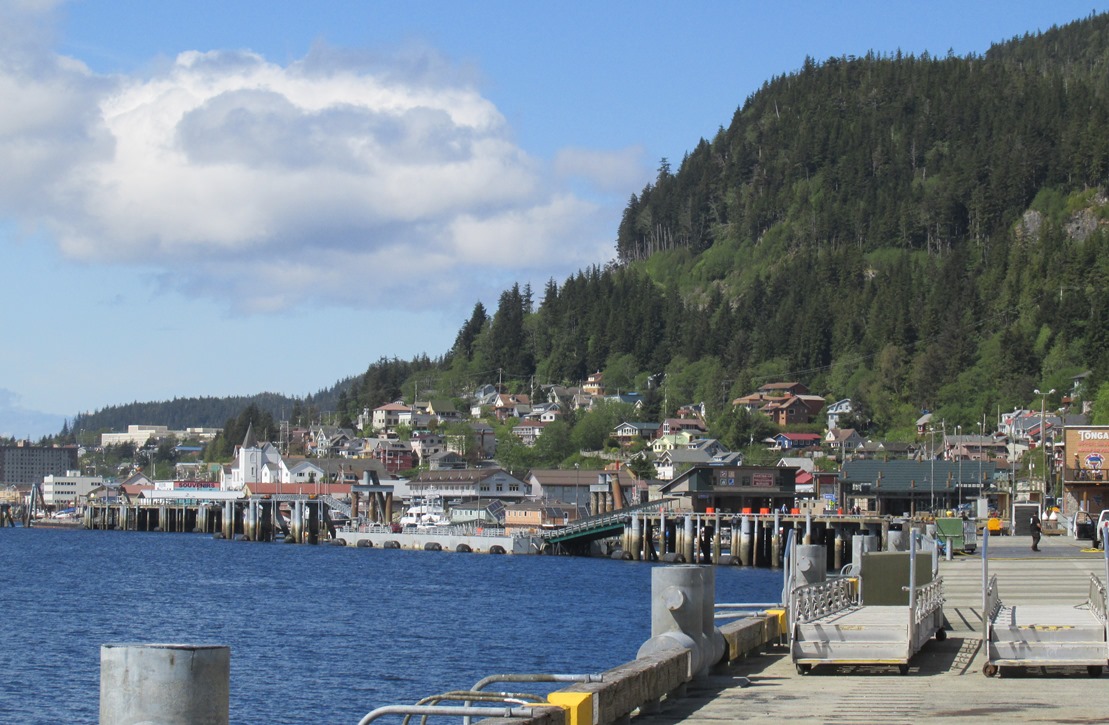Cruise ships will continue to bypass Ketchikan if COVID-19 cases remain high. That’s the word from senior city and pandemic response officials.
Ketchikan’s City Council on Thursday discussed whether the community’s emergency operations center continues to serve a useful purpose.
Audio Player
Big cruise ships are officially planning their return to Alaska this summer, with ships scheduled to arrive starting in late July. Seven of the towering vessels are currently slated to tie up in town in the latter portion of the summer, the city’s port director said Thursday.
But if Ketchikan can’t get a handle on the spread of COVID-19, City Manager Karl Amylon told the City Council, cruise lines may decide to skip Alaska’s First City.
“We’ve been told point-blank by industry representatives that they will bypass a community that’s in a red zone, that has major outbreaks,” Amylon said.
And it’s already happened twice this month. UnCruise, a boutique cruise line that runs boats carrying a few dozen passengers apiece, has so far canceled two planned stops in Ketchikan as the community faces its largest-ever COVID-19 outbreak. As of Friday, a New York Times database showed Ketchikan’s rate of spread as the second-highest in the country, trailing only rural Chattahoochee County, Georgia.
Amid the outbreak, City Council members were discussing the idea of shutting down the community’s emergency operations center, which coordinates the pandemic response. Its most visible function is as a clearinghouse for pandemic information — case numbers, risk levels, recommendations to reduce the disease’s spread. Amylon said cruise lines were looking to the EOC for the most accurate, up-to-date information on COVID-19 in Ketchikan.
Council Member Judy Zenge said it wasn’t clear the EOC’s actions during this latest outbreak were having much effect. She said it was time to look at either making the EOC’s recommendations more effective, or shutting it down.
“So (the) EOC hasn’t prevented any COVID cases. So COVID is still here. I understand the industry is going to be looking to you, or to the EOC. But is there not another organization who handles this elsewhere?” Zenge asked. “Isn’t it public health or health care folks that handle this?”
Emergency manager Abner Hoage said that Ketchikan’s public health office couldn’t currently handle the extra workload. And he said it’s difficult to gauge just how effective the EOC’s actions were at stemming the spread.
“Maybe we stand down, and we’re totally fine, and nothing happens,” Hoage said. “And then again, maybe this information is what’s been keeping us from having uncontrolled spread.”
He emphasized that the EOC’s primary tool for keeping a lid on the pandemic was information: a list of voluntary recommendations.
“We are not closing the school, we are not closing the businesses, we’re recommending actions based on science that people should take in order to protect themselves,” Hoage said.
But Council Member Riley Gass said that much of the time, the recommendations don’t feel all that voluntary.
“As you said, they’re recommendations, but we all know that the borough, the city, the schools, all the governments follow them to a T. Most organizations and businesses try to and are afraid that if they don’t, they’re going to be deemed out of control or something,” Gass said.
He said it’s frustrating to see Little League games canceled and businesses running at reduced capacity.
“I just think that the EOC has done their purpose,” Gass said. “And at this time, the risk is a millifraction of what it was a year ago because all those people who are at risk have been vaccinated.”
Hoage pointed out that there still are many people who don’t yet have access to the vaccine: namely, everyone under the age of 12.
“I’ve heard the argument that they don’t have significant negative outcomes from COVID. They survive it, basically, right?” Hoage said. “But what we don’t know is, what are the long term effects of COVID going to be (on) kids? And do we really want to write that off for them?”
Some members of the council said they supported continued operations. Council Member Janalee Gage called shutting the entity down a “fool’s choice” given the potential impact on Ketchikan’s cruise ship traffic. Council Member Sam Bergeron said he, too, was sick of sports, parades and other gatherings being canceled.
“But at the same time, we also have to be adults in the room, and especially those of us that are sitting at this table, we have a fiduciary responsibility for public safety. And we also have a fiduciary responsibility to create an environment where our economy can thrive,” Bergeron said.
He said he favored giving the entity some “teeth” to enforce its recommendations. Bergeron was an early proponent of a mask mandate in Ketchikan, but he later withdrew the proposal in the face of public backlash last year.
The council ultimately declined to take any action on the EOC following the discussion. Vice Mayor Dave Kiffer, who presided in the absence of the city’s mayor, said it would be improper — the council had only announced it’d be discussing the subject, not acting on it.
Gass asked that the council consider taking action at its next meeting on June 3.






